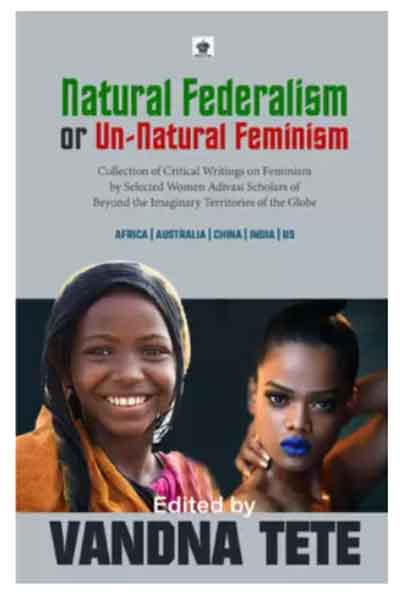In the times when ‘unifying’ symbols are used as tools to homogenise, ‘diversity’ is only appropriated in the service of ‘unification’ project, the urgency of ‘pluriversality’ is felt more strongly. The book opens with an introduction by Vandana Tete, who is also the editor, traces the origin of ‘feminism’ and feminist movement, to European Society. Her introduction sets tone for all the chapters in the book- ‘feminism’ as movement and thought fails to cover Adivasi society, indigenous women and women of colour under its umbrella shade. She doesn’t negate the impact of feminist movement in bringing forward voices of women against patriarchy but she clearly states that violence inflicted by imperialism and colonialism on tribal societies and therefore tribal women were never considered as issue by ‘feminists’ and feminist movement.

In the introduction of a book titled- ‘Another Knowledge is Possible’ (2007), Boaventura de Sousa Santos emphasises upon importance of recognising ‘epistemological diversity’ and ‘difference’ in knowledge systems. Contrarily, feminism as both- thought and movement, failed to somehow consider issues of women from different socio-political context and for very long kept its boundaries so water tight that the question of not just tribal women but also cis-women, cis-men and others on the spectrum, were not considered as part of the movement. This can be understood as a form of epistemic blindfolded-ness. Njoki Wane’s article “African Indigenous Feminist thought” in the book (the one reviewed) highlight this crisis of how indigenous knowledge faced disruption, got “buried under the weight of modernity” during colonialism and how significant it is that African feminism draws from “indigenous ways of knowing” through “collectivism and collaboration”. Plus, how vital it is for indigenous people to be known in their own terms and the ways they want themselves to be known writes Kate Shanley in her article. Having said that, the problem of representation also plays against feminism, that is to say, when one strand of thought- specific issues pertaining to single social context of feminism, is considered as the soul of the entire movement, give rise to non-association, the idea that ‘I don’t think I am a feminist’ or feminism is not about men or feminism is just about European women etc might surface. This is not to say, non-association should be discouraged, not at all.
From the beginning of the book, the idea of ‘tribal sovereignty’ became one of the focal points and this is reflective in Kate Shanley’s article as well. Then, Renya Ramirez in her writing focuses on re-thinking ‘nationalism’ and ‘tribal sovereignty’ and claim for “native feminism” that too not just one but many native feminisms, so as to address the violence against women effectively. This article critically engages with the problem of shunning feminism outrightly and kind of romanticising the tribal or indigenous societies. Laura Tohe in her article highlights how in Dine culture, women never had to fight for their importance in the society, commanded agency and control, as it is a matrilineal society where women for example, need not to be protected or looked after by male members of the society.
Ula Taylor talks about struggle of black feminists and the tensions between white feminism and society at large, how earlier black feminist issues were not accepted or welcomed within white feminism etc. Taylor highlights the rise of third wave and ‘womanism’ and the significant contribution of black feminists in fighting against multi-level oppression. M.A. Jaimes Guerrero also put forward the idea of “Native Womanism” which encapsulates the impact of US colonialism and patriarchy on women’s life and the resultant struggles for land. She aspires for “being indigenous” which is egalitarian and preserves “kinship” ties. Melissa Lucashenko questions why Aboriginal women are less in entire feminist struggle and openly announces that it is not enough for white feminists to ‘show’ support to Aboriginal women and how feminists lack the sensitivity towards oppression of black women by white Australian colonialists. Haunani Kay Trask shares that all sorts of issues in Hawaii- health, food, land, violence etc are direct results of colonialism and domination of USA and therefore it’s not just a “women’s issue” as women’s oppression in Hawaii is “connected to larger cultural postures”. She clearly states that she identifies herself more as a nationalist and also sheds light on cultural hierarchy and how women’s “rights” as understood in dominant discourse- American or Eurocentric, is not larger than the culture.
M. Annette Jaimes and Theresa Halsey shun the pre-conceived notion about Native American Indian women being non-violent, and narrates how these women have been at the forefront against the corporate development venture projects and have violently resisted against such interventions. She has also identified two major problems- white supremacism and colonialism and want alliances that are beneficial for American Indian people.
Diedre Bádéj and Kay Schaffer & Song Xianlin takes into consideration traditional mythical beliefs and religious practices that are part of oral literary traditions and festivals of Africa, in case of former and women’s publications-especially literary and life-writings, in case of latter, to elaborate on feminist perspectives and positioning of women in African and Chinese society. Bádéj attempts to “(re)place women of African descent at the sociocultural core” where women were depicted and considered to be powerful and African femineity is not the ‘opposite’ of masculinity, therefore the need to look at that centre for understanding male-female relationship. Similarly, Dr. Masters in her article writes that it is important for youth to embrace both aspects of “living”- feminine and masculine energy, so as to move beyond stereotypes. Schaffer and Xianlin narrates how women’s writings emerged and responded to multiple ‘constructs’ of and about ‘feminine’. They analyse four different “trends or directions” of women’s writings to emerge with a picture of contemporary feminist practices in China, and opines that through these writings’ women “articulates a politics of difference” with immense possibilities within feminism to emerge. The final article by Maile, Eve and Angie talks aboy how native feminist theories unearth the deeper connections of colonialism, “heteropatriarchy” and gender. They kind of cover major arguments putted forward by all the articles in the book as well.
There are some points of indifference for me – (a) Feminism as a thought-movement is west-centric but it can’t be brushed under the carpet by undermining the struggles of women across the globe, even if it had clear domination of west.
(b) Criticising white women for loyalty towards their culture seems a bit ironic as one of the major themes that ran through all the articles was the idea of -indigenous ‘culture’ over and above all. The arguments presented highlight that indigenous women gravitate more for community/native rights and consider it above everything else.
I would like to conclude by putting forward points of serious agreements with the book that yes, it is absolutely problematic a nature of feminism -to homogenise different epistemologies, not being sensitive towards the context-specific issues associated with gender, obliviating tendencies of horrors of colonialism and imperialism etc. I genuinely stand in solidarity with all the expressions, concerns and aspects highlighted by the authors in the book.
Natural Federalism or Un-natural Feminism
Edited by Vandana Tete. Published by Pyara Kerketta Foundation. Jharkhand. 2022. Pp 256. Rs 300. ISBN:978-93-93978-56-1
Tamanna Joshi is an independent researcher and student of a Post Graduate Diploma titled – Folklore and Culture Studies provided by Indra Gandhi National Open University (IGNOU), Delhi, India.
Bibliography:
Santos, de Sousa B, ed. 2007. Another Knowledge is Possible : Beyond Northern
Epistemologies. London: Verso. ISBN: 13:978-1-84467-246-1.
Tete, V. 2022. Natural Federalism or Un-natural Feminism. Jharkhand: Pyara Kerketta
Foundation. ISBN: 978-93-93978-56-1.














































